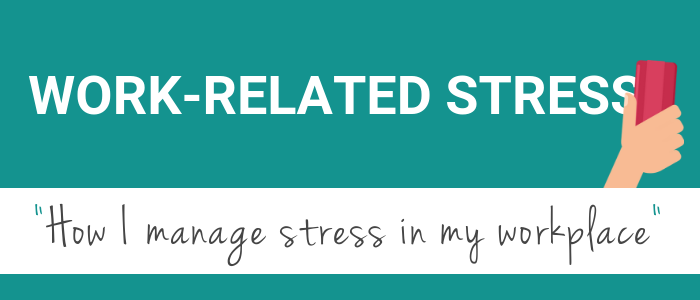How I manage stress in my workplace
Recent reports by HSE (Health and Safety Executive) show that a staggering 12.5 million days were lost due to depression, anxiety or work-related stress from 2016 -2017.

Just like our physical health, mental health and well-being are equally important, particularly in the workplace. But, due to increased pressures in the workplace, which may include strict deadlines, lack of management, unclear guidelines, and even bullying, it’s no surprise that stress is now becoming the largest cause of work-related absences.
So, what can be done to prevent work-related stress?
Focus on a healthy work/life balance
I find that overworking can cause exhaustion, which then has an impact on my home and social life. So, I always make the most of the time I spend when I’m out of the office and put loose plans in place so I have something to look forward to at the weekend and evenings.
I believe a work/life balance is essential for our wellbeing, and with recent studies showing that ‘in the past year, 74% of people have felt so stressed they have been overwhelmed or unable to cope’, it goes to show how many people are becoming affected by the result of stress in their day-to-day lives.

When at work, take regular breaks
When I need to, I get out of the office and go for a short walk. I take some deep breaths and take in the scenery around me. During my lunch break, I always leave the office so I’m away from any work distractions. Being away from the office environment helps my mind to ‘switch off’ and relax, ensuring I’m refreshed for the next part of the day.
Know when to say ‘no’
Taking on too much at work can trigger stress. I know from personal experience that it can be hard to say no, as you don’t want to let anyone down. However, it’s impossible to take on every task and, if you try, it may result in a burnout.
If you feel you’ve taken on too much and you’re struggling to manage with your tasks, speak to your line manager and make them aware.

Switch off when you leave the office
I try my best to switch off from anything work-related once I’ve left. I also turn my email notifications off on my phone to avoid the temptation of checking emails. If I need to finish a project, I’ll stay the extra 30 minutes rather than taking my work home with me.
Tell someone
If I feel overwhelmed or anxious, I ask to have a quick chat with my manager so they are aware of how I’m feeling and can put measures in place to manage my workload and ease anxiety.
Ask for flexible working hours, if possible
In the past when I’ve found work overwhelming, I asked for flexible working hours, to ensure that I’m not putting myself under further stress. Be sure to work with your employer as ‘flexi-hours’ may be a new concept to the organisation, and it’s important to ensure both parties are comfortable with the agreement.
Lean on your support system
Having a great support network of friends and family around me really helps as I can be open about how I feel without being judged.
Get professional support
I will also encourage anyone to speak to their doctor, or seek a professional counsellor for confidential support if they’re struggling.
What can your employer do to help manage stress at work?
Putting people at the heart of your business will encourage productivity, engagement and creativity. Ensuring your employees and colleagues are supported at work with the tools to equip them to succeed in their role will allow for a positive workplace culture.
I suggest the following:
![]() Create a culture that encourages positive mental health and encourages employees to speak freely and/or open up when they are struggling.
Create a culture that encourages positive mental health and encourages employees to speak freely and/or open up when they are struggling. - Be approachable and non-judgemental. Offering a listening ear will help employees to feel valued and supported.
- Offer workplace adjustments and/or flexible working hours temporarily to help you manage.
- Undertake a Mental Health First Aid (MHFA) course to help notice the signs of mental distress and assist with support.
It’s essential that workplace wellbeing becomes a priority for workplaces throughout the UK. Creating healthier and happier workplaces helps employees, like myself, to thrive and not just survive.

Find a therapist dealing with Stress
All therapists are verified professionals
 Create a culture that encourages positive mental health and encourages employees to speak freely and/or open up when they are struggling.
Create a culture that encourages positive mental health and encourages employees to speak freely and/or open up when they are struggling. 




